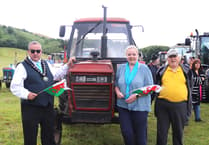A SMALLHOLDER who lived in a tree-house he built has been convicted of failing to comply with planning enforcement notices served on him by Powys council.
The council had issued the enforcement notices against Eddie McIntosh as it it said the wooden structures he had erected at his Mellowcroft farm home in Radnorshire to create a rural retreat that also offered alternative therapy and off-grid holiday accommodation didn’t have planning permission.
He also didn’t have permission to live at the site which in 2012 featured in an episode of Chanel 4 series Kevin McCloud’s Man Made Home.
The 52-year-old had denied 18 charges at his trial at Merthyr Tydfil Crown Court which lasted four days. But after just one hour and 20 minutes of deliberation the jury of five men and seven women returned guilty verdicts on each charge under the town and country planning act.
He was accused of continuing to use Mellowcroft, which is off the main A44 road at Llandegley, near Llandrindod Wells, as his his residence and failing to remove a motor home and various wooden structures he’d built, all in defiance of the enforcement notices.
The court was told McIntosh had already appealed the notices to the independent planning inspector who, in a January 2016 decision, mostly upheld the notices as served by the council in March 2015.
Trial judge, His Honour Christopher Vosper QC fined McIntosh, of Mellowcroft, Llandegley, a total of £750.
Prosecutor Christian Jowett said the council’s costs were in the region of £35,000, which the judge said the defendant wouldn’t be able to pay.
McIntosh was also given a 12 month conditional discharge on three charges, relating to the motor home, a shed and the tree house as they had now been moved or mostly demolished, but hadn’t been at the end of the enforcement period in October 2016.
Mr Vosper told him: "The jury have convicted you on all 18 counts. I understand you just took a stand against the order I understand you felt frustrated but you can’t simply ignore the order especially after an inquiry by the independent inspector."
The judge said he had to impose a financial penalty but acknowledged the defendant, who is reliant on selling vegetables he grows at Mellowcroft from a trailer beside the A44, only had a yearly income of around £2,500.
He said had he fined him £100 for the 15 offences, not dealt with by conditional discharge, the total would be £1,500 so instead told him to pay £750 over the next 12 months.
Should McIntosh fail to pay he will have to serve 28 days in jail.
The structures he failed to removed included compost toilet, a motor home, a drover’s cabin, a shepherd’s hut, a wood fired bath, a footbridge and a wind turbine and a jetty as well as a stone circle.
Earlier Jonathan Rees, defending, had asked the jury to use "common sense" when deciding the case.
He told them the enforcement notices had succeeded in bringing about the outcome that the council wanted, that unauthorised uses such as as the retreat, education and alternative therapies, no longer took place and Mellowcroft was returned to being agricultural land.
He said the structures that remained were essential for the agricultural use the planning inspector had said was allowed.
Mr Rees said: "The jetty and footbridge allow him to cross his farm and tend to his pond without falling in it.
"A compost toilet, it was the only toilet on site allowing him and volunteers to use the toilet when working rather than just go behind a tree with no dignity or privacy at all.
"The tree house has not been used since the decision by the planning inspection and is being dismantled now.
"The change of use notices have been successful and led to compliance and have led to what the council set out to do, turn Mellocroft back into an agricultural smallholding, they have been successful."
Mr Rees reminded the jury of the defendant’s personal struggles and said he’d tried his best to comply with the council’s requirements throughout them.
He said: ""During this period he was confronting personal difficulties, his mental and physical health and what appears to be the irreconcilable break up with his wife and estrangement from his young daughter.
"Still he succeeded through all of these matters to turn the land back to an agricultural small holding while living in what many people would regard as a state of squalor in a motor home and the back of a converted lorry trailer. Mr McIntosh says he had nowhere else to live but the prosecution wanted him to get rid of the only roof over his head.
"The council want to make him homeless and penniless. You, after 13 years, can stop this. You are entitled to say Mr McIntosh has done everything he could be reasonably expected to do and I ask you to find in common sense and acquit Mr McIntosh of these charges."
Prosecutor Christian Jowett had however told the jury in his summing up: "In this case the prosecution say Mr McIntosh clearly loved Mellowcroft and loved what he was was doing there. It is difficult for you not to have sympathy for him but he is still bound by the planning inspector’s decisions. He is not able to not comply because he thinks it is not common sense or unreasonable.
"He invested all that time and money in breach of planning law he was clearly aggrieved when he received that notice and it was the end of his vision for Mellowcroft. That is why he made the effort to appeal and he said he became ’fixated’ and the reason why he didn’t comply by October 29. 2016.
"He knew what was required by the enforcement notice."




-with-Liz-Lewis-(Senior-Nur.jpeg?width=209&height=140&crop=209:145,smart&quality=75)